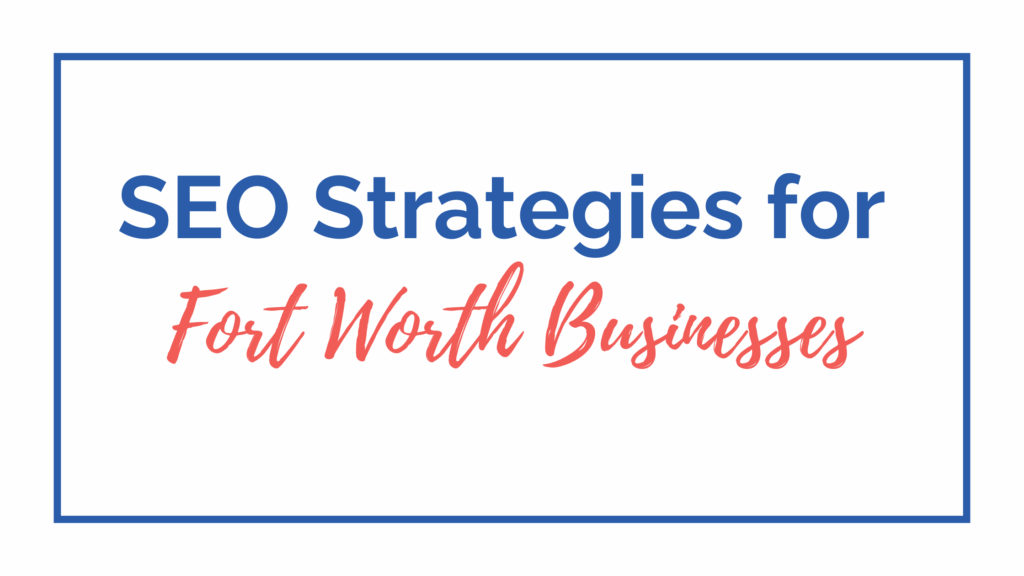Welcome to your Fort Worth SEO playbook. If your business isn’t showing up in local Google searches, you’re missing out on customers who are right in your backyard. Local SEO, Google My Business, Fort Worth keywords, local backlinks — these are the levers that separate thriving neighborhood shops from invisible ones online.
In this comprehensive guide, you’ll discover exactly how to dominate Fort Worth SEO and local search: how to fully optimize your Google Business Profile, craft Fort Worth–targeted content that converts, build powerful local backlinks and citations, and manage reviews and reputation that boost visibility. You’ll see a real example of a Fort Worth small business that leveraged these tactics — and learn how to monitor and iterate for continued growth.

Whether you’re a storefront retailer, local service provider, or niche shop in Fort Worth, this guide walks you through practical, high-impact steps built for your market. Let’s dive into how you can outrank your local competition and become the go-to business in Fort Worth searches.
Why Local SEO Matters for Fort Worth Businesses

The “Map Pack” and Local 3-Pack: What You’re Missing
Much of the value in local SEO comes from the Map Pack (top 3 local results + map) that appears at the top of Google search results. If your business isn’t in that 3-pack for queries like “Fort Worth electrician near me”, you’re missing the bulk of clicks. Local 3-pack visibility dramatically increases click-through and foot traffic.
Search Behavior in Fort Worth: Mobile & “Near Me” Searches
In Fort Worth, like most U.S. metros, a large share of searches on mobile devices include “near me,” “closest,” or a ZIP/neighborhood. People often search while commuting, walking, or at the moment of decision. That means you must align your site, business listing, and content to that mindset.
Relevance, Distance & Prominence: Google’s Local Algorithm
Google ranks local results based on three main dimensions: relevance (how well your listing matches the search), distance (how far your business is from the searcher or within your service area), and prominence (how well-known and authoritative your business is).
Prominence is influenced by your backlink profile, reviews, citations, and brand signals. The more local authority you build, the higher you can push in Fort Worth searches.
👉 Request a free Fort Worth SEO audit
Optimize Your Google Business Profile (GBP / GMB)
Claiming, Verifying & Completing Your Listing
Start by claiming your Google Business Profile (formerly Google My Business). This is non-negotiable — Google heavily relies on GBP data for local rankings and showing your business in Maps.
Once claimed, verify your listing (via postcard, phone, or email). Without verification, your listing won’t perform at its full potential.
Then complete every field: business name, address, phone, website, categories, services, hours, holiday hours, special hours, service area (if applicable). Incomplete listings are less likely to rank or convert.
Use of Categories, Attributes, Services & Hours
Choose your primary and secondary categories wisely — these tell Google what you do. Use specific service categories rather than generic ones.
Use attributes (e.g. “wheelchair accessible,” “offers appointments”) and list services and products within GBP. This adds semantic signals.
Set accurate business hours, including special hours (holidays, seasonal). Inconsistent hours or missing hours reduce user trust and ranking performance.
Posting, Q&A, Photos & Videos
Google allows posts (updates, offers, events) via GBP — use them weekly to keep your listing fresh.
Answer customer questions (Q&A) directly on the listing; preempt common queries like pricing, parking, etc.
Add high-quality photos and videos: storefront, team, work examples. Use geo-tagged photos (if possible), and name image files with Fort Worth keywords (e.g., “Fort-Worth-HVAC-installation.jpg”).
Regularly refresh the visual content to keep the listing active.
Review Generation & Reply Strategy
Reviews are a top local ranking factor and trust signal. Encourage satisfied customers to leave reviews on Google (and relevant niche platforms).
Respond thoughtfully to all reviews — thank customers, address issues. This shows engagement and care. The velocity of recent reviews also matters (i.e., getting reviews consistently over time).
If you notice drops in review volume, run campaigns (email reminders, signage, receipts) to prompt reviews.
Rather than just passively ask for reviews, invest in a review funnel — after service, send a short link to your Google review page, combined with a brief note: “We rely on community referrals — your 30-second review would mean a lot.” Over time, test different phrasings to maximize conversion.
Fort Worth-Focused Keyword Strategy & On-Page Local SEO
Geo-modified & Long-Tail Keywords
For Fort Worth SEO, you need to incorporate geo-modified and long-tail keywords, not just “mechanic near me,” but “Fort Worth auto mechanic near me,” “auto repair Fort Worth TX,” “east Fort Worth mechanic”.
Use the long-tail terms from our list (like Fort Worth SEO services, Fort Worth Google My Business optimization) in titles, meta descriptions, header tags, and naturally in content.
For more insights on what to avoid, check out our guide on the common Fort Worth SEO mistakes that could be holding your local rankings back.
Local Landing Pages & Neighborhood Pages
If your business serves multiple neighborhoods (e.g., Arlington Heights, River Oaks, Southlake, etc.), create local landing pages or neighborhood pages targeting those areas: “HVAC repair Arlington Heights Fort Worth.” That helps you rank for more specific queries and capture hyperlocal search.
Each landing page should include localized content (mentions of local roads, landmarks, events) and a call to action.
Schema & Local Business Markup
Implement Local Business Schema (JSON-LD) markup on your site. Include properties like name, address, phone, opening hours, geo-coordinates, service area, etc.
You can also use Review markup for aggregate review rating (if you have many reviews on site).
Such structured data helps Google parse and surface details (e.g. star ratings) in SERPs.
Internal Linking & Local Navigation
Use your site’s navigation to highlight local pages. Interlink blog posts and service pages that mention Fort Worth. Create contextual links using anchor text like “Fort Worth plumbing services” that point to your Fort Worth landing page.
Avoid burying Fort Worth content too deeply; make sure it’s accessible within a few clicks from homepage to strengthen its internal link authority.
Building Local Backlinks & Citations in Fort Worth
Local Directories & Business Association Listings
Start with high-authority Fort Worth, Tarrant County, and DFW directories to strengthen your Fort Worth SEO foundation — such as your local Chamber of Commerce, Better Business Bureau, city business directories, and local newspapers.
Ensure NAP consistency (same name, address, phone) across all citations. Use tools (e.g. Moz Local, BrightLocal) to audit and detect duplicates.
Priority directories: Fort Worth Chamber, Visit Fort Worth, local trade associations, local niche directories in your industry.
Local Media & Blogs Outreach
Pitch guest posts, case studies, or industry commentary to Fort Worth news sites, Fort Worth business blogs, local lifestyle publications to strengthen your Fort Worth SEO strategy. A well-placed “Fort Worth small business roundup” or “local business spotlight” often carries backlinks.
Offer data, insights, or stories that interest their local audience.
Sponsorships, Events & Community Partnerships
Sponsor or host local events (e.g. farmers markets, school events, charity 5Ks) and get backlinks from event pages or local media coverage.
Co-sponsor or partner with other Fort Worth businesses (e.g., a hardware store sponsoring your HVAC workshop) and exchange mentions or links.
Create a local resource page (e.g. “Top Fort Worth Home Services Directory”) you can promote — a linkable asset.
“Crisis content” and Newsworthy Local Assets
If there is a local newsworthy topic related to your industry (e.g. “Fort Worth heat wave and AC repair demand”), create timely content, data visualizations, or commentary. Local outlets may link to or quote you.
Similarly, publish original research or surveys (even small scale) — e.g. “Top 5 Fort Worth business concerns in 2025,” and reach out to local media to cite it.
Collaborate with Fort Worth nonprofits or municipal initiatives (e.g. city sustainability, events) — those institutional websites often have strong domain authority and linking to you (e.g. “local partner” pages) boosts your prominence.
Reviews, Reputation & Social Signals
Encouraging & Managing Online Reviews
Beyond Google, also maintain reviews on relevant niche platforms (Yelp, Facebook, industry-specific directories).
Set up triggers to request reviews: via email after a service, via SMS, on a receipt, or point-of-sale prompts.
Expose your best reviews on your website (with schema markup) — Google sometimes pulls from onsite reviews too.
Handling Negative Reviews Professionally
When negative feedback comes, respond publicly with empathy, propose a solution, and invite offline discussion. This shows future customers that you care.
If a review violates policy (spam, false claims), you can request removal via Google’s dispute process.
Track sentiment trends — if you see recurring complaints (e.g. “hard to reach by phone”), fix the underlying operations issue.
Social Media Engagement & Local Mentions
Engage actively on local community groups (Fort Worth Facebook groups, Nextdoor, local forums). Mentions (without links) can influence your prominence and brand awareness.
Share your Fort Worth content on social media — use local hashtags (#FortWorth, #DFW) to amplify reach.
Encourage customers to tag your business location on Instagram or Facebook — those social signals reinforce locality.
Technical & Performance Factors for Fort Worth SEO
Mobile Speed, Core Web Vitals & User Experience
Since many local searches are from mobile, your site must be fast, mobile-first, and meet Core Web Vitals thresholds (LCP, CLS, FID) — all essential factors for strong Fort Worth SEO performance. If pages are slow, Google may penalize ranking.
Use caching, image compression, efficient code, and a lightweight mobile theme or responsive design.
Ensure click-to-call buttons, maps, directions, and local forms are readily available on mobile.
Local Hosting, SSL & Secure Site
While hosting location has limited direct impact, having your server closer to Texas/USA can help latency for local users.
Use HTTPS/SSL everywhere — security is a trust and ranking factor.
Ensure your site is technically sound: no broken pages, canonicalization issues, crawl errors, or duplicate content.
NAP Consistency & Duplicate Listing Cleanup
Audit all online listings (paid/unpaid) for your business to ensure your name, address, phone are identical everywhere.
Eliminate duplicate Google Business listings or merged listings — duplicates dilute ranking strength.
Use tools like BrightLocal, Moz Local, Yext to detect and fix inconsistent citations.
Local Schema, Embedded Maps & Geotagging
Embed a Google Map of your service area or location on your contact or landing pages.
Add geo-coordinates in your Local Business Schema markup.
Use image geotagging (GPS metadata in image files) sparingly; Google may ignore, but it’s an additional signal.
Also include Breadcrumb schema or LocalBusiness schema and openingHours schema.
Monitoring, Iteration & Local SEO Growth Strategy
Tools: GMB Insights, Search Console, Local SEO Tools
Use Google My Business (GBP) Insights to see queries used to find your listing, actions (calls, visits), and photo views.
Use Google Search Console and Google Analytics to track local landing pages’ performance and keyword impressions in your region.
Use specialized local SEO tools (BrightLocal, Whitespark, Moz Local) to track local rankings, audit citations, and monitor your competitors.
Tracking Local Keyword Rankings & Map Pack Performance
Set up rank tracking for your key Fort Worth keywords (e.g. “Fort Worth plumber near me,” “local SEO Fort Worth”) including both organic and map pack positions — a crucial step in maintaining strong Fort Worth SEO performance.
Track click-through rate (CTR), impression share, and conversion metrics (calls, form completions) tied to local queries.
Watch for fluctuations — if you lose map pack status, investigate what changed (competitor listings, review drop, GMB edits).
Experiments & A/B Testing
Test different calls-to-action (e.g. “Schedule a free estimate” vs “Call now”) on local pages.
Experiment with review prompts timing or phrasing to boost review conversion.
Try variations in page layout (map placement, local testimonials) and see what improves engagement and conversions.
Scaling: Multiple Service Areas & Multi-Location SEO
If your business expands (e.g. open a second location in Hurst, Grapevine, etc.), replicate local SEO methodology per location — unique landing pages, GBP for each, local backlinks, reviews.
Ensure each location has distinct content and service area definitions (to avoid internal competition).
As you scale, centralize your local SEO playbook, documentation, and dashboards for consistent performance.
Example Case: A Fort Worth Business That Grew via Local SEO
Let’s imagine “Trinity HVAC & Air Conditioning, Fort Worth” — a local HVAC company.
- Baseline: No GBP or an incomplete GBP listing, low number of reviews, generic service pages with no Fort Worth mentions, minimal backlinks from local sources.
- Strategy steps executed: 1. Claimed, verified, and revamped their Google Business Profile with full categories, photos, service listing, and weekly posts. 2. Created neighborhood landing pages: “Trinity HVAC Fort Worth West,” “Trinity HVAC Haltom City,” etc., each optimized for local keywords. 3. Got local backlinks: sponsor a school event (kids’ festival) and got coverage from the Fort Worth School District website; guest article in the Fort Worth Business Press; directory listings with Fort Worth Chamber, Visit Fort Worth. 4. Launched a review funnel prompting happy customers to review; responded to reviews promptly. 5. Optimized site speed & mobile UX, fixed NAP inconsistencies, added LocalBusiness schema.
- Results (hypothetical but plausible): - Within 6 months: from zero map pack appearances to top-3 for “Fort Worth HVAC repair near me.” - Organic traffic to local pages increased 60%. - Leads (calls/form submissions) rose by 45%. - Many leads came directly from map pack and mobile clicks.
This demonstrates how layering these tactics in your Fort Worth context leads to compounding results.
Quick Takeaways / Key Points
- Claim and optimize your Google Business Profile (GBP) fully — it’s your gateway to the map pack.
- Use Fort Worth–specific and long-tail keywords in your content and pages (e.g. “Fort Worth SEO local services,” “north Fort Worth plumber near me”).
- Build local backlinks and citations via Fort Worth directories, media, event sponsorships, and linkable assets.
- Encourage and manage customer reviews consistently — reviews are a major ranking & trust signal.
- Ensure technical excellence — mobile speed, schema, NAP consistency, no duplicate listings.
- Monitor performance with GMB insights, Search Console, rank tracking, and iterate over time.
- Leverage hyperlocal content and partnerships unique to Fort Worth for differentiated link signals.
Conclusion & Call to Action
Optimizing your local presence in Fort Worth is not optional — it’s essential. When you apply Google My Business best practices, leverage Fort Worth–targeted keywords, build local citations and backlinks, manage reviews, and ensure technical health, you position your business to outrank competitors in map results and search queries.
For a Fort Worth small business, the local SEO opportunity is enormous: customers searching “service near me” are often ready to buy. By committing to a consistent, data-driven local SEO process, you’ll steadily capture more visibility, more leads, and more revenue — right from your neighborhood.
If you’d like help auditing your current Fort Worth SEO presence or executing this strategy, we at Panther City Digital Marketing specialize in exactly that. Let’s talk — schedule a free local SEO audit with us and we’ll discover which quick wins you can deploy today.

💬 What Our Clients Say
“Megan is super professional and easy to work with! She is super nice and supportive! She is very knowledgeable about what she does and doesn’t skimp on any details! I think working with Megan = quality and a thorough job well done! Thank you for your dedication!” — Paula H. ⭐️⭐️⭐️⭐️⭐️
FAQs
1. How long does it take to see results from Fort Worth SEO?
Typically you may begin seeing improvements in map pack placement and local lead volume in 3 to 6 months, depending on competitiveness, your starting baseline, and consistency of optimization efforts.
2. Do I need to target every Fort Worth neighborhood?
You don’t need to saturate every neighborhood, but focusing on 2–3 primary service areas or neighborhoods (with distinct landing pages) gives you better reach while maintaining focus and content quality.
3. Can I do local SEO without Google Business Profile?
No — GBP is foundational. Without it, you lose control of your local listing, and Google lacks structured signals to place you in map pack results. Claiming and optimizing GBP is non-negotiable.
4. Are directory listings still valuable in 2025?
Yes — trusted, local directories and business associations still provide citation boost and referral traffic. The key is quality and consistency, not volume of low-quality listings.
5. How do I deal with bad reviews on Google?
Respond politely and promptly, offering to resolve concerns offline. Show empathy, take accountability where appropriate, and invite negative reviewers to contact you to rectify the problem. Over time, positive reviews and active reputation management will outweigh negatives.
References
- Google support: How to improve your local ranking on Google



